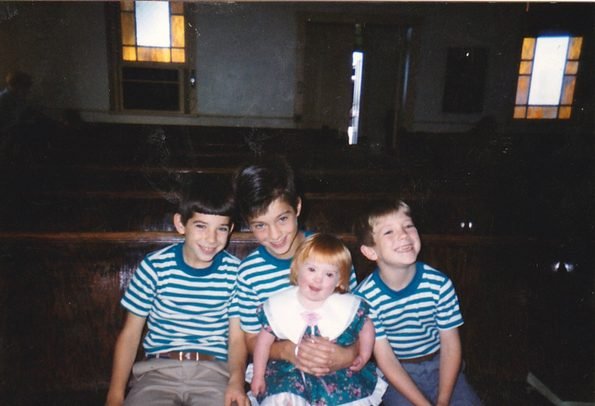
In a post on The Nashville Scene titled How a Terrible Worship Song Drove Me From Christianity, Casey Black details one of :
The year was 2001. A traveling worship band took the stage and began singing to the Christians gathered in the large sanctuary of First Baptist Church in Nashville. I was there with my girlfriend, a country singer, and when the band’s song became familiar enough she raised her hands, closed her eyes, and started singing along. Everyone else did too, so there were nearly 1,000 hands raised, 500 voices singing, 1,000 eyes closed.
I used to admire this unselfconscious abandon in my Christian brothers and sisters. I even found it beautiful. I was accustomed to the subdued, scripted and ritualistic worship of the Catholic Church I was raised in, and this display of emotion and affection toward God didn’t come naturally to me (insofar as the things that we are taught to do when we are young seem “natural” to us when we’re older). And even though my first encounter with this type of worship — which sometimes escalated to jumping up and down, even crying — was through the window of a church, making me wonder what sort of cult was inside, eventually the approach felt fresh and freeing to me; like it was a much more appropriate way to worship the creator of everything. So I followed along as best I could, though I could never do it without feeling extremely self-conscious, or like I was doing it wrong.
It so happened that as I stood in First Baptist beside the country singer, I was severely depressed, and had been for years. Everything back then, in my very early 20s, was an exercise in tortured acting and painful perseverance. Going to church and singing the songs were no exception. But the voice of my guilty Catholic conscience — which I suspect was partly responsible for my depression in the first place — was louder than ever, and it urged me to keep going, to keep raising my hands and singing. It had convinced me long before I was conscious that there could be no other life but for God, and it seemed to say now that maybe, just maybe, if my soul were pure enough, if I closed my eyes hard enough, if I sang truly enough, maybe I might meet God and find some relief in Him from my sadness. So heavy as my heart and hands were that day, I raised them up to God and sang along with the crowd…
…A few songs into the service, the singer stopped and told the gathering that the band had written a new song out on the road. He said they felt the song was pretty special, anointed even (!) — which I thought was a pretty cocky thing to say, even if I did admire his confidence, even if I did think it was pretty cool that Jesus Himself had blessed the song. He said they’d like to play it for us, and he went into the chord progression.
It seemed like a typical worship song to me, and after multiple repetitions of the chorus, everyone was back to the routine of singing along with hands raised and eyes closed, as if they’d been taught the song at birth. For a chorus or two, so was I. I was hanging in there, trying to worship my Creator as best I could, sad creation as I was. (“But that isn’t the Creator’s fault!” said the Catholic voice. “If you’re unhappy you’re just not trying hard enough!”) I sang like I’d sung to Him hundreds of times before. I sang to get closer and I sang for some relief and I sang to praise.
But then I stopped. I had to stop. There was something about the lyric that bugged me. I opened my eyes.
Let our song be like sweet incense to your heart, Oh God
This seemed an awful lyric. And the songwriter that I am, I had to take it apart while everyone else kept singing:
Let our song,
…which is a sound,
be like sweet incense,
…which is a smell, or something that produces smell,
to your heart,
…which is an organ that can neither hear nor smell!!!!!
Good Lord, are you hearing this?
I knew I was being a bit harsh on the writer. But come on, it was garbage. It was throwaway stuff. I looked around to see if I could spot anyone else who might feel the same way. We were in the songwriting capital of the world, after all. Maybe I’d see someone with her mouth agape, or someone holding his ears and crying. But what I saw were hundreds of my peers with closed eyes and raised hands singing those absolutely nonsensical words.
It was then that I felt the opening of my first true and conscious schism with religion, and with my religious self. The sight scared me. “This is not good. This is dangerous. This is really weird. These people are singing words that literally make no sense; which would be fine if they were singing along to some dumb song on the radio, but they’re not just singing along to some dumb song on the radio, they’re offering this nonsense directly to God. Giving it as a gift! How can they do this? How could they not think before they sing? Doesn’t God deserve better? Something that makes logical sense at least? Sweet as the singers are, might God be holding His ears and weeping right now?”
When I got done looking at the crowd I thought of myself, and I saw myself as one of those people and it frightened me. I had sung a million songs like this without thinking. Maybe not as horrendously nonsensical as this one, but close enough. And if I had sung songs like this without thinking, what else had I done without thinking? What else had I been taught to do that I had never questioned? What did I believe, what had I professed, that I didn’t actually understand? How come I am singing nonsense with all these other people? Such profane questions got my good heart to racing, and for the first time in my life my Catholic voice had no good answers…
…The Catholic voice got me to go to church and sing a few more songs. But its power faded. The questions the horrible lyric provoked were seismic enough to shake my religion, and when those led to bigger and tougher questions, my religion crumbled. Within a year after hearing the song, I stopped singing worship songs, and I stopped calling myself a Christian altogether…
It was not that long ago that virtually every church in America sang hymns from a hymn book. Now, it is hard to find a church that does sing hymns. What happened? As I look back over the 50 years I spent in the Christian church, I can see a slow movement away from singing hymns. It started with what I call youth group/camp fire songs, songs like Do Lord and Give Me Joy in My Heart. I’m sure more than a few readers remember making new verses for Give Me Joy in My Heart, verses like:
Give me wax on my board, keep me surfing for the Lord,
Give me wax on my board, I pray,
Give me wax on my board, keep me surfing for the Lord,
Keep me surfing ’till the break of day.Sing hosanna, sing hosanna,
Sing hosanna to the King of kings!
Sing hosanna, sing hosanna,
Sing hosanna to the King.Give me soles on my shoes, help me witness to the Jews,
Give me soles on my shoes, I pray,
Give me soles on my shoes, help me witness to the Jews,
Help me witness ’till the break of day.Give me gas in my Ford, keep me driving for the Lord,
Give me gas in my Ford, I pray,
Give me gas in my Ford, keep me driving for the Lord,
Keep me surfing ’till the break of day
Ah, such memories. These songs were meant to be fun and most of all they were meant to be sung. As a Baptist, singing was very much a part of the worship experience. I was taught to singing lustily and loudly unto to the Lord. Songs like Do Lord were easy to remember and quite singable, so it is no surprise they caught on with Evangelical church members. To this day, I have fond memories of the chorus singing time during Sunday night devotions at Midwestern Baptist College. My favorite song was a medley of songs called the Hash Chorus:
Isn’t He wonderful, wonderful, wonderful
Isn’t Jesus my Lord wonderful.
Eyes have seen ears have heard – it’s recorded in God’s Word
Isn’t Jesus my Lord …Wonderful, wonderful Jesus is to me,
Counselor, Prince of Peace, Mighty God is He.
Saving me, keeping me, from all sin and shame.
Wonderful is my Redeemer praise His name.Precious name, O how sweet!
Hope of earth and joy of Heav’n;
Precious name, O how sweet!
Hope of earth and joy of . .. .Heaven is a wonderful place
Filled with Glory and Grace
I want to see my Savior’s face
Heaven is a wonderful placeBut until then, my heart will go on singing,
Until then, with joy I’ll carry on,
Until the day, my eyes behold that city,
Until the day God calls me home.This world is not my home – I’m just a passin’ through
My treasures are laid up – somewhere beyond the blue
The angels beckon me from Heaven’s open door
And I can’t feel at home in this world any . . .More, more about Jesus – more, more about Jesus
More of His saving fullness see –
More of His Love who died for me.
Out these singable ditties, came praise and worship music. The first time we sang a praise and worship song in a church I pastored was in the late 1980’s. While hymns still dominated the singing, bit by bit praise and worship songs became a more prominent part of Sunday worship. Sometimes, on Sunday evening we would just sing choruses and praise and worship songs. I remember there were preachers who opposed this practice. They believed that these songs were theologically shallow, rarely stopping to consider how shallow and often heretical the Stamps Baxter/Southern Gospel songs were that they sung at their church.
While there are a small number of churches that have refused to embrace praise and worship music, most churches have succumbed to the latest fad and have made praise and worship music central to their worship experience. Some churches use a blended worship approach, weaving hymns and praise and worship songs together, while others have packed up their hymn books, put up an overhead, recruited a band and worship leader, and have joined the praise and worship revolution.
Casey Black’s reaction to praise and worship music is quite understandable. I know Polly and I had a similar reaction when we began to seriously look at our faith. We loved singing praise and worship songs, owning dozen of praise and worship CD’s. Our three oldest children played in our church’s worship band and continued to play in another church’s band after I left the ministry. (They are quite proficient guitarists and I miss hearing them rock out for Jesus) But, as we started analyzing every aspect of our faith, there came a time where we focused on music, particularly praise and worship music.
While we found praise and worship music quite singable and emotionally stirring, unlike the Episcopal church we attended that used unsingable songs, we came to the conclusion that most praise and worship songs were little more than mood setters meant to stir the emotions. Evangelical baby boomers in particular, having grown up on classic rock and roll, love praise and worship music. Why? Having heard numerous sermons about the evils of secular music, especially rock and roll, praise and worship music allows baby boomers to sing Christian lyrics set to music with a rock and roll sound and not feel guilty for it. (For you who are my age and older. 50 years ago, did you ever think that some day the typical Evangelical church would have a band, complete with those straight out of Africa drums?) Some churches now put Christian lyrics to secular music, songs like Bridge over Troubled Water become Jesus is the Bridge over Troubled Water.
These days, many Evangelical churches focus on what is called ‘felt needs.’ While they sing songs that say it is All About You Jesus, the truth is it is all about the flet needs of the Christian; it’s all about me, Jesus. The focus is on feeling a connection to God and having the deep, longing desire (felt need) of your heart met. Add to this that many Evangelical pastors now preach relational sermons, messages meant to appeal to the emotional needs of parishioners, it’s no wonder that many Evangelical worship services are little more than a religious version of a Tony Robbins seminar.
Go to a nearby Evangelical megachurch and observe the worship service. Pay attention to the music, particularly the lyrics. Gone are the deep theological lyrics from yesteryear. In their place are lyrics that often can be described as boyfriend/girlfriend songs, songs that just as easily could be sung to a lover. Watch as parishioners close their eyes and emotionally embrace the moment. Some churches even dim the lights during this time, giving the service a more intimate feeling. To put this in secular terms, the music and the lighting is used to set the mood. Soon Jesus will be coming by to pick you up for a date. If you are lucky, you and Jesus will have a sweet, intimate experience, not unlike a sexual orgasm.
The typical praise and worship time at the corner Evangelical church is like what I call spiritual masturbation in a group setting. Eyes closed, everyone start pleasuring, praising Jesus. It’s feel good music that is meant to stir emotions and lead to a spiritual orgasm. Instead of the focus being of God, the focus is on the individual parishioner. It’s their needs that matter. Even the notion of a communal experience is gone. The focus has moved from corporate worship to individual worship.
On one hand, there’s nothing wrong with what I have described above. Anyone who has ever gone to a secular concert knows how emotionally stirring the music can be. Polly and I attended a Darius Rucker concert two years ago and halfway through the concert I leaned over to Polly and said, this is just like a church service. Everywhere I looked people were in the moment, singing along with Rucker. Some were standing, others were dancing, and a few of the Baptists in the crowd had their hands raised praising Jesus. There was an emotional electricity in the building, every bit as powerful as anything I ever felt in church.
Here’s the danger of praise and worship music. If it is was just about a group of people singing, enjoying the music, and then going home, that’d be fine, but in many Evangelical churches the music is used to set the mood and to put the parishioner in an emotionally vulnerable frame of mind. The music is just a pretext. The goal is drive home the pastor’s message. Many churches now use tightly scripted programs, with each part of the program meant to prepare parishioners for hearing the words of God from the man of God. The goal is always the sermon, with every sermon meant to elicit some sort of response from the parishioner. It is in this kind of setting that a person can be easily manipulated.

Casey Black had a ‘what is this shit I’m singing’ moment. I can relate to his experience because that is exactly how I felt not long before I deconverted. Both Polly and I grew tired of the shallowness, monotony, and repetition of praise and worship music. This is one of the reasons we attended the Episcopal church for a time. There, we found lofty, soaring hymns, so soaring that no one could sing them. While the deepness, richness, and the antiquity of the liturgy appealed to us, the music was downright awful, so much so that we stopped singing. We went from ‘what is this shit I’m singing’ to ‘who can sing this shit’.
I suspect Black was looking for substance. Most of the people I know who were once committed Christians tell of their desire to find substance. Yet, no matter where they looked, they found emptiness, and it is that emptiness that set in motion their deconversion. Polly and I spent several years trying to find a church that took seriously the teachings of Christ. In the end, what we found is that most churches are the same, different name, same lack of substance. It is this lack of substance that opened up our mind and gave us the freedom to reconsider the veracity of the claims of Christianity. (Please see But, Our Church is DIFFERENT!)
Black’s article elicited the usual response from Evangelicals:
- It sounds like the enemy (satan) has won you over. There is spiritual warfare and a tug of war for our minds everyday. I personally have been where you are and researched every religion and worldview there is because of my shaken world. However, it wasn’t until I decided to find pure truth no matter what it was, even if I didn’t like it, that I came to my senses and came back to Jesus. You will come to yours I am sure, just don’t give up so easily. If you let other people, who are fallen, influence you that much then strengthen your mind. You don’t have to be so easily manipulated by the fallen condition of the world around you.
- I wish for you this..BIG …understanding..it’s really..a large way..worship…Hope you soul is lifted with meaningful verses of old traditional hyms..the words!! And you know.. God lives our critical mind. He created it! It’s perfectly ok. To ask..question..doubt..Look at John Macarther..he tested Christianity as an atheist as did Cs Lewis!! Read these brilliant minds..who thought as you..Go Seek..Question..Ask God to reveal himself to Your Mind!!I know..I am a scientist
- If you believe any part of your thrown away faith, I plead you to look at this. According to this verse you cannot end up in Heaven when you die because you have thrown Jesus to the side. You will sit in hell, eternal torment and think, I am here because of a song lyric…I pray that does not one day become reality for you.
- I read your story, and what strikes me is that your story speaks loudly that you haven’t met the Person of Jesus… possibly seen Him from a distance, but certainly not connected with Him directly and relationally.
- You’ve definitely got bigger problems than the lyrics of a worship song. Hope you find yourself before it’s too late! I’m disappointed that you would choose to publicize and ridicule the place of worship. FBC Nachville is a fine church and I question the entire article. Good luck, but I won’t be buying any of your work!
- Wow…you are really messed up to “leave” Christianity over a song written by a mortal. Makes me wonder whether you were ever “there” (how can one leave a place he has never been?) And methinks you were never there…you don’t seem to know that God’s heart is not an organ. His heart is all-sensing. And as for a song being incense, read Revelation. The prayers of the saints (believers) are incense unto God. It’s stated over and over again. And the song was a prayer. If the writer liked it, let him like it. Why are you acting petty and competitive?
You can read more of the wonderful comments from Evangelicals here.
I plan to give a shout out to Casey Black. I am curious about where he is today and where his journey out of Christianity has taken him. While he is roundly criticized by Evangelicals, I appreciate his willingness to take a hard look at his faith. His journey out of Christianity may have begun with a song, but I suspect that there is much more to the Casey Black’s loss of faith than his reaction to a praise and worship song.








 Phillips’s books played an crucial part in the Satan/demon hysteria that was prominent in Fundamentalist churches in the 1980’s and 1990’s.
Phillips’s books played an crucial part in the Satan/demon hysteria that was prominent in Fundamentalist churches in the 1980’s and 1990’s. 